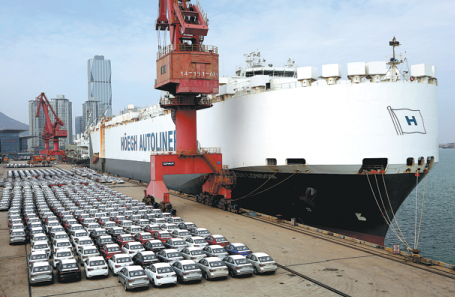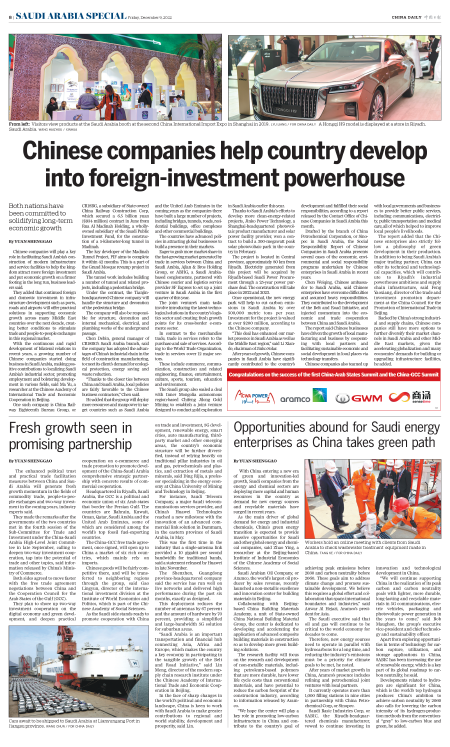
Cars await to be shipped to Saudi Arabia at Lianyungang Port in Jiangsu province.
The enhanced political trust and practical trade facilitation measures between China and Saudi Arabia will generate fresh growth momentum in the fields of commodity trade, people-to-people exchanges and two-way investment in the coming years, industry experts said.
They made the remarks after the governments of the two countries met in the fourth session of the Sub-Committee for Trade and Investment under the China-Saudi Arabia High-Level Joint Committee in late September, calling to deepen two-way investment cooperation, tap into the potential of trade and other topics, said information released by China's Ministry of Commerce.
Both sides agreed to move faster with the free trade agreement negotiations between China and the Cooperation Council for the Arab States of the Gulf (GCC).
They plan to shore up two-way investment cooperation on the digital economy and green development, and deepen practical cooperation on e-commerce and trade promotion to promote development of the China-Saudi Arabia comprehensive strategic partnership with concrete results of commercial cooperation.
Headquartered in Riyadh, Saudi Arabia, the GCC is a political and economic union of six Arab states that border the Persian Gulf. The countries are Bahrain, Kuwait, Oman, Qatar, Saudi Arabia and the United Arab Emirates, some of which are considered among the world's top fossil fuel-exporting countries.
The China-GCC free trade agreement, once signed, will open up to China a market of six rich countries, which mainly rely on imports.
Chinese goods will be fairly competitive there, and will be transferred to neighboring regions through the group, said Gao Lingyun, director of the international investment division at the Institute of World Economics and Politics, which is part of the Chinese Academy of Social Sciences.
As the Saudi side stands ready to promote cooperation with China on trade and investment, 5G development, renewable energy, smart cities, auto manufacturing, third-party market and other emerging areas, the country's economic structure will be further diversified, instead of relying heavily on traditional pillar industries in oil and gas, petrochemicals and plastics, and extraction of metals and minerals, said Ding Rijia, a professor specializing in the energy economy at China University of Mining and Technology in Beijing.
For instance, Saudi Telecom Company, a major Saudi telecommunications services provider, and China's Huawei Technologies reached a new milestone with the innovation of an advanced commercial link solution in Dammam, in the eastern province of Saudi Arabia, in May.
This was the first time in the industry that a single-antenna link provided a 10 gigabit per second bandwidth for traditional bands, said a statement released by Huawei in late November.
The Shenzhen, Guangdong province-headquartered company said the service has run well on live networks and delivered high performance during the past six months, exactly as designed.
This deployment reduces the number of antennas by 67 percent and the amount of hardware by 70 percent, providing a simplified and large-bandwidth 5G solution for suburban areas.
"Saudi Arabia is an important transportation and financial hub connecting Asia, Africa and Europe, which makes the country a key economy in participating in the tangible growth of the Belt and Road Initiative," said Lin Meng, director of the modern supply chain research institute under the Chinese Academy of International Trade and Economic Cooperation in Beijing.
In the face of sharp changes in the world's political and economic landscape, China is keen to work with Saudi Arabia to make greater contributions to regional and world stability, development and prosperity, said Lin.

